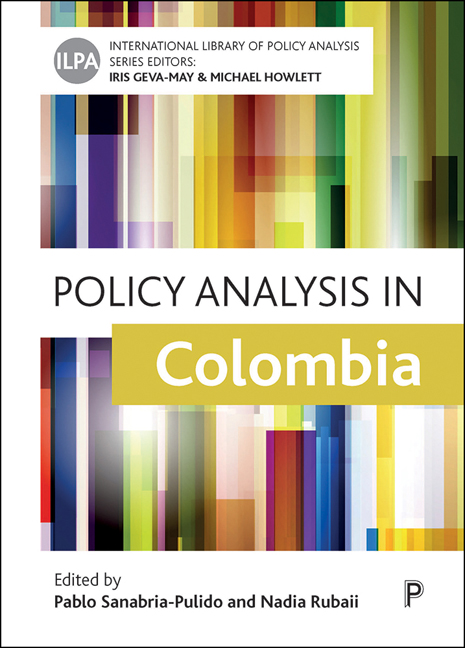Book contents
- Frontmatter
- Dedication
- Contents
- List of Figures and Tables
- List of Abbreviations
- Notes on Contributors
- Editors’ Introduction to the Series
- Policy Analysis in Colombia: An Introduction
- Part One Policy Analysis in Contemporary Colombia
- One The policy Analysis Movement in Colombia: The State of the Art
- Two Evolution of Policy Analysis as a Field of Study and Instruction in Colombia
- Three Policy Analysis, Bureaucratic Capacity and Public Administration Reforms in Colombia
- Part Two Policy Analysis within National and Subnational Governments
- Four Policy Analysis Inside Central Government in Colombia
- Five Policy Analysis and the Legislature in Colombia
- Six Policy Analysis in the Colombian Constitutional Court
- Seven Metropolitan Governance and Policy Analysis in Colombia
- Eight Policy Analysis for Decision Making in Colombian Local Governments
- Part Three Policy Analysis in Key Policy Domains
- Nine Policy Analysis in the Education Sector in Colombia
- Ten Policy Analysis in the Health Sector in Colombia
- Eleven Policy Analysis and Decision Making in the Military Forces: The Havana Experience
- Twelve Technocracy, Decision Making and Economic Policy in Colombia
- Thirteen Social Policy, Target Populations and Policy Analysis in Colombia
- Part Four Policy Analysis Beyond the State
- Fourteen Political Parties and Policy Analysis in Colombia
- Fifteen Policy Analysis and NGOs in Colombia
- Sixteen Media, Evidence and Policy Analysis in Colombia
- Conclusion: Building Capacity for Policy Analysis Amid Tensions and Challenges in Colombia
- Index
Twelve - Technocracy, Decision Making and Economic Policy in Colombia
Published online by Cambridge University Press: 10 March 2021
- Frontmatter
- Dedication
- Contents
- List of Figures and Tables
- List of Abbreviations
- Notes on Contributors
- Editors’ Introduction to the Series
- Policy Analysis in Colombia: An Introduction
- Part One Policy Analysis in Contemporary Colombia
- One The policy Analysis Movement in Colombia: The State of the Art
- Two Evolution of Policy Analysis as a Field of Study and Instruction in Colombia
- Three Policy Analysis, Bureaucratic Capacity and Public Administration Reforms in Colombia
- Part Two Policy Analysis within National and Subnational Governments
- Four Policy Analysis Inside Central Government in Colombia
- Five Policy Analysis and the Legislature in Colombia
- Six Policy Analysis in the Colombian Constitutional Court
- Seven Metropolitan Governance and Policy Analysis in Colombia
- Eight Policy Analysis for Decision Making in Colombian Local Governments
- Part Three Policy Analysis in Key Policy Domains
- Nine Policy Analysis in the Education Sector in Colombia
- Ten Policy Analysis in the Health Sector in Colombia
- Eleven Policy Analysis and Decision Making in the Military Forces: The Havana Experience
- Twelve Technocracy, Decision Making and Economic Policy in Colombia
- Thirteen Social Policy, Target Populations and Policy Analysis in Colombia
- Part Four Policy Analysis Beyond the State
- Fourteen Political Parties and Policy Analysis in Colombia
- Fifteen Policy Analysis and NGOs in Colombia
- Sixteen Media, Evidence and Policy Analysis in Colombia
- Conclusion: Building Capacity for Policy Analysis Amid Tensions and Challenges in Colombia
- Index
Summary
Introduction
Since 1980, the design and execution of economic policy in Colombia took place in the context of adequate institutional rules and a qualified group of professional economists. These conditions generated a positive environment for economic decision making, for addressing the volatility of the international economy and for strengthening economic rules and institutions. Furthermore, these particular factors facilitated a greater independence from political interests in the adoption of economic decisions.
Based on a qualitative review of the past 40 years, we find that capacity building for sound economic decision making can be attributed to the presence of a technocracy, instrumental in the decision-making process, and to the ability of public institutions to adjust to the changing economic environment by designing new rules without disregarding considerations emerging from the political forces.
To assess this confluence of willingness to implement institutional change and well-trained policy makers, we interviewed six policy makers, mostly economists, who held high-level positions in the public sector and participated in policy decision making from 1980 to 2016. For the purpose of this chapter, we define institutional willingness for economic change as the capacity of public agencies responsible for the design and execution of economic policy to adjust and reform the rules and the organizations responsible for economic management, particularly at the main public agencies: the Ministry of Finance and Public Credit and the Central Bank (Banco de la República – BR).
We define technocracy as the group of trained economists with graduate degrees in economics – Master's or PhD – in the policy and decision-making scenarios, something essential for building capacity in the economic policy area. In Colombia, economic decision making shifted from an “illustrated elite of lawyers and engineers” – mainly experts in public finance and coffee sector policy who had the responsibility for the conduction of the economy before 1980 – to this group of professional and highly trained economists with a more comprehensive understanding of economy policy, development and growth, and the capacity to make decisions at relevant public institutions (Álvarez et al, 2019).
- Type
- Chapter
- Information
- Policy Analysis in Colombia , pp. 203 - 222Publisher: Bristol University PressPrint publication year: 2020



